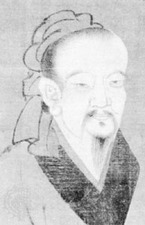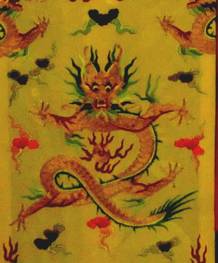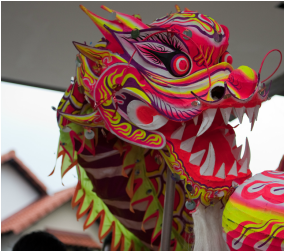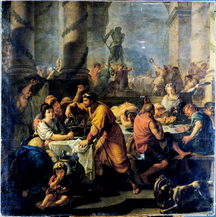 Qu Yuan - Public Domain
Qu Yuan - Public Domain
 Qu Yuan - Public Domain Qu Yuan - Public Domain The tradition of making and eating zongzi is strongly associated with the death of the great and much loved poet and patriot Qu Yuan. His suicide by drowning in a river was seen as a selfless act of patriotism by the people who loved him and who paid tribute to him by throwing rice balls into the river for his soul to eat. According to legend, his soul materialized before fishermen and began wailing that he was starving because the dragon in the river was eating the rice they threw to him. Read more
0 Comments
 Dragons in Chinese legend The dragon has played an important part in Chinese culture for thousands of years and is central to many myths, legends and traditions. This article briefly looks at how the dragon evolved to become such an essential part of Chinese culture. In China from the earliest of times the dragon has been regarded as a lucky creature, bestowing fortune and blessing upon the lives people. There is an ancient tradition that the Chinese people are descended from the dragon and it is a belief that still found deeply rooted in Chinese culture and the thinking. Unlike western societies where dragons are often seen as evil, the Chinese people revere the dragon for its majesty and gravity and for its beneficial properties. Read more  Colorful and spectacular! The Chinese Dragon Dance is an extremely colorful and spectacular event that is traditionally performed at Chinese festivals around the word today. This article looks briefly at how it originated and evolved into the spectacular performances we see today. A Divine Beast In ancient Chinese culture the dragon was revered and venerated as a divine beast. It was regarded as auspicious creature that brought good luck and enhanced the well being of people. It became the symbol of honesty and decorum and was thought to control the waters of the earth especially rivers and the rainfall. Read more  Christmas Rose - By Wildfeuer - CC BY 2.5 Christmas Rose - By Wildfeuer - CC BY 2.5 The legend of the Christmas Rose tells the story of how a young shepherdess named Madelon, through her love and devotion, came to give the baby Jesus a gift more precious than gold, frankincense or myrrh. The tradition tells how the shepherds, while watching their flocks, were visited by an Angel who was leading the Magi to the birthplace of Jesus. The Angel told them of the birth of Jesus who would be known as the Prince of Peace, the King of Kings and the Saviour of their people. Overjoyed, the shepherds left their flocks to visit the new born king taking him such gifts as they could afford and were befitting of their status such as, honey, fruit and snow-white doves. But what could a Madelon, poor shepherd girl who possessed nothing give the King of Kings? Read more  Saturnalia by Antoine Callet - CC0 Saturnalia by Antoine Callet - CC0 Christmas in the modern world is a time of revelry, eating and overindulgence of drink, the giving of presents, carol singing and much more. The Roman festival of Saturnalia is believed to have been a forerunner of the Christmas we know and celebrate today giving us many customs and traditions that we use and enjoy. The Roman Festival of Saturnalia An early forerunner to Christmas was the ancient Roman festival of Saturnalia. This festival was held in honour Saturn an agricultural deity who reigned during the Golden Age. This was a time of peace, when all was prosperous and plentiful. A time when people’s needs were met with out having to work and every one lived in a state of social equality with one another. The festival commenced on the 17th December to the 23rd of December. Saturnalia could be celebrated anywhere in the Roman Empire not just Rome. Read more |
Authorzteve t evans Categories
All
Archives
January 2020
|
 RSS Feed
RSS Feed
